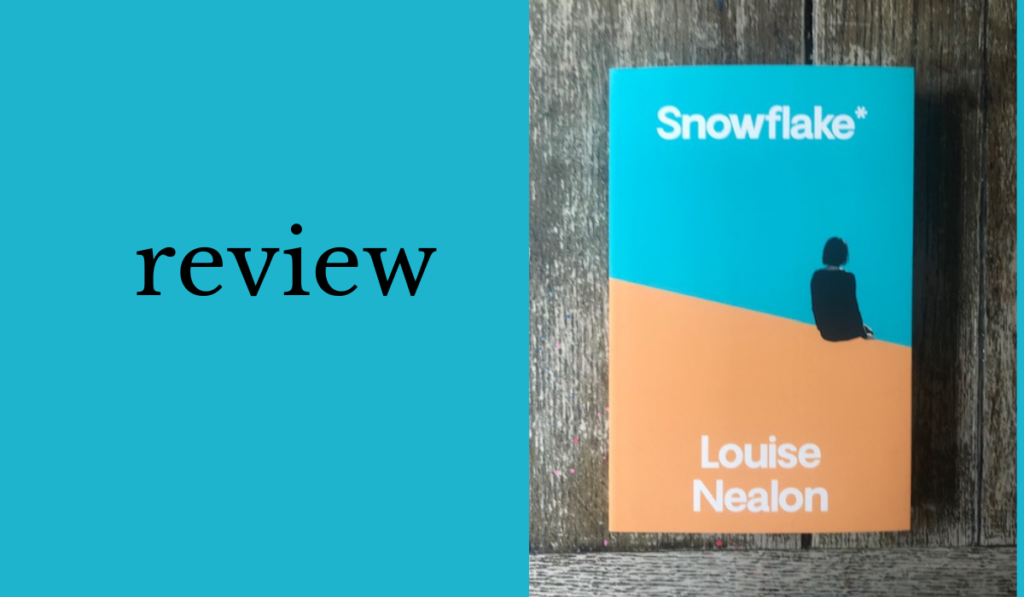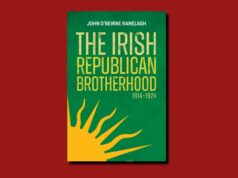
Snowflake|Louise Nealon|Manilla London|paperback|ISBN 9781786580696|€15.99
by Fiona Murphy
‘I don’t even know why I panic. There’s nothing to panic about. I spend all my time losing things and finding them again. I’m starting to think there’s some part of me doing it on purpose. I’m caught in a vicious cycle. It’s the most mundane form of self-sabotage.’
Mundane self-sabotage is somehow simultaneously an accurate and inaccurate way to describe Louise Nealon’s debut ‘Snowflake’. Debbie seems like a perfectly ordinary girl, experiencing the anxiety-ridden ups and downs of growing up. And yet, as we follow Debbie through her first year of college in Trinity, commuting from her family’s farm in Kildare, we realise that Debbie’s head is not a quiet one to take up residence in. Claustrophobic, off-kilter and breathless, Nealon’s narrative holds an ethereal, almost supernatural element that grabs the darker side of mental health issues by the throat.
Debbie has never pretended to be normal. How could she, when she wakes from a terrifying dream of a boy dying in a car crash, only to find a car crumpled in a collision at her front gate? She already knows what the boy’s face will look like. And she also already knows he is dead.
Convinced she was inside his head moments before the crash, Debbie finds herself consumed by these dark, and frighteningly realistic dreams. Her obsession is only encouraged by her mother Maeve, who believes our dreams are not in fact dreams at all, but merely a way to break down the boundaries between reality and our shared lives.
What initially seems a frighteningly dysfunctional family life begins to draw you into their strange rituals and beliefs, as layer after layer of reality is peeled back.
As her Uncle Billy tries to keep Debbie’s head above water – and away from her mother’s influence – we slowly unpack years of family trauma, unexplained tragedies and the dark, unspooling life that unfolds ahead of Debbie herself if these dreams continue.
Despite her strange and intriguing home life, those are not the most interesting things about Debbie. She herself is an enigma, not her otherworldly mother or her secretly tortured uncle. Debbie surprises us; do not make the mistake of thinking she is dull or drifting or shy. Although outwardly her actions may sometimes suggest these things, her inner life is rich to the point of neurosis, with too many lives, too many thoughts crushing each other in their attempts to assert themselves.
As a result, there are two different Debbies. ‘Home Debbie’, who is easily overwhelmed yet deeply in touch with the that unknowable side of herself that is as dark and strange as the far side of the moon and ‘Trinity Debbie’ who hides her quirky, country home life. ‘Home Debbie’ has grown up knowing her connection with mysticism is deeply at odds with the reality of her small-town life around her, where the main entertainment is pints in the local pub and carrying on up at the Stone Age passage tomb up the road, where all the teenagers go to lose their virginity. It’s also where Debbie was conceived, and at times, it’s as if the strange power of the ancient site has transferred into Debbie herself.
‘Trinity Debbie’, on the other hand tries not to let anyone know she is anything less than capable (despite being ‘allergic to reality’) and embraces the city and all its vices with an enthusiasm that borders on addiction. ‘Trinity Debbie’ is not plagued by dreams that don’t belong to her, by the fear of what ledge her mother will seek out next, by the crippling sense that she has one foot in reality and the other in a whole other world.
And what happens when those two worlds collide inside of her?
Nealon pens a timely and searing look at modern approaches to mental illness, the culture of wearing it loud and proud and how something that was kept secret, personal and even shamefully hidden has become commodified in today’s world.
Nealon flies in the face of the ‘trend’ of wellbeing where ‘awareness’ is the word of the day and everyone’s spewing it like a magic spell that will fix everything. Snowflake looks at two sides of the coin; those who can afford to use mental health as the source of their anxiety about living, and those who cannot afford to do so. Debbie’s family almost don’t seem to have the vocabulary needed to express that they are utterly spiralling mentally, while her Trinity friends say ‘depression’ in the same way you would say ‘caught a cold’. The incongruency is startling and stark. Who qualifies for the label mentally ill? What qualifies as depression? The feeling that you’re not good enough or the feeling that can lead you to the edge of a bridge with no intention of turning back?
In many ways, the normalisation of speaking about mental health issues in candid, more aware conversations has been fantastic for opening a dialogue, but there are only certain types of mental illnesses we’re willing to talk about: the ones we can understand, the ones that don’t frighten or inconvenience us too much, that can be packaged up in neat little Instagram captions.
There is only so long that Debbie’s duality is sustainable for, as she trudges along her family’s well-worn path of addiction, mental illness and isolation from the very community they crave acceptance from. The pattern must be disrupted, the cycle must be broken. But is Debbie the one to do it when half her life is lived out of this reality?
Nealon makes a point that many of us are afraid to broach in this climate—that discussing mental illness is encouraged, but the follow up of providing resources and destigmatising its darker, more complex symptoms has a long way to go.












